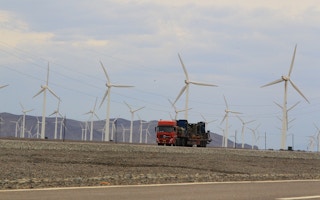The 2015 Paris climate change conference was a momentous political outcome as more than 190 nations have committed to take action on climate change by reducing greenhouse gas emissions and becoming more resilient to climate impacts.
To continue reading, subscribe to Eco‑Business.
There's something for everyone. We offer a range of subscription plans.
- Access our stories and receive our Insights Weekly newsletter with the free EB Member plan.
- Unlock unlimited access to our content and archive with EB Circle.
- Publish your content with EB Premium.
The summit, known as COP21, formulated a very ambitious long-term goal to keep temperature increase below two degree centigrade. But the actual commitments that countries made in Paris are not enough to achieve that goal.
Therefore, the level of ambition will need to be increased and negotiations on that will begin in 2018. Countries’ willingness to take the next step to increase the level of ambition will depend on their ability to deliver on the first step, which they committed to in Paris.
Fortunately, huge financial commitments were made in and around the Paris conference and there was a massive capitalization of the Green Climate Fund (GCF) where many donors made pledges of financial support. The Multilateral Development Banks (MDBs) have committed to significantly increasing their share of climate financing.
What’s critical now is to build capacity in developing countries to submit solid project proposals to attract investment. We need to help countries understand how they can access an array of finance and blend it, develop a conducive environment for investors.
Promises were made by the private sector as well. A growing number of businesses are beginning to realize that sustainability can be a driver for cost reduction and help grow business by creating innovative products and services.
The value of sustainability to a company’s brand image is another benefit. Improving the interplay between the public and private sectors can help us move from the current billions to the needed trillions in climate finance. Turning Nationally Determined Contributions (NDCs) into long-term climate investment plans is critical for developing countries to mobilize the needed finance for a green, low-carbon future. .
Ultimately, what we need is broad coalitions of actors to work together for transformational systemic change - beyond individual projects, sectors or policies.
“
What’s critical now is to build capacity in developing countries to submit solid project proposals to attract investment.
Another promising sign is that, according to a report released by Bloomberg New Energy Finance (BNEF), the renewable energy sector is set to attract $7.8 trillion investment, including $3.4 trillion for solar, $3.1 trillion for wind and $911 billion for hydro power by 2040.
Also, a report by a global consultancy KPMG shows that the green bonds market more than tripled in size from $11 billion in 2013 to $36.6 billion in 2014. This figure was set to hit US$100 billion by end 2015.
Faced with a carbon-constrained world, more companies are also creating new products which promote energy efficiency and conservation, such as mobile phone applications, smart metering software, and renewable energy technologies.
Investments in renewables have now overtaken investments in fossil fuel and renewable investments in developing countries have significantly overtaken those in industrialized countries – all of which is positive. But the reality remains that making more money available and decreasing costs of technology is not enough to address the challenges of climate change.
There are a number of realities that remain. First, addressing climate change is important, but it must be done in a way that increases energy access and improves the livelihoods of poor people. Second, institutional capacity in developing countries is not enhanced by a stroke of magic.
We still have a long way to go in terms of building institutional capabilities for a strong pipeline of project proposals. Third, many developing countries are already very deeply indebted and their ability to borrow money is limited. Their aim is to determine where to invest using a limited borrowing capacity and will be focusing on infrastructure that benefits economic growth rather than environmental issues.
Another issue is that even if the role of businesses is increasingly recognized and they are willing to engage, fundamental principles that relate to the corporate risk-reward criteria still need to be met in order for companies to engage in supporting NDCs.
Although we are witnessing positive developments, there is a growing emphasis on making more capital available into the system, however, not enough attention has been paid to enhancing the capacity of the system to absorb the capital in ways that are 1) beneficial to the poor in developing countries and 2) acceptable to those that bring the capital.
To begin to understand some of these key challenges better, the Global Green Growth Institute (GGGI), a member-based international organization and its partners will organize the Global Green Growth Week (GGGWeek2016) on September 5-9 on Jeju Island, Republic of Korea.
The sessions throughout the five-day event will focus on discussing ways to mobilize finance for climate action and green growth, drive renewable energy and green investment and bring benefits and create better lives and livelihoods for poor people in society by using green growth policies.
Finance is an important issue. GGGWeek2016 will examine three aspects of finance: the importance of developing innovative international financial instruments for green growth, strengthening national financing vehicles and building solid project proposals. The biggest challenge is finance and we need to find blended financial models and innovative solutions to mobilize finance.
Yvo de Boer is the director general of the Global Green Growth Institute. This piece was written exclusively for Eco-Business.











